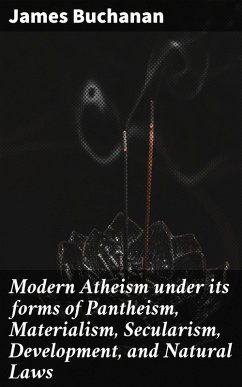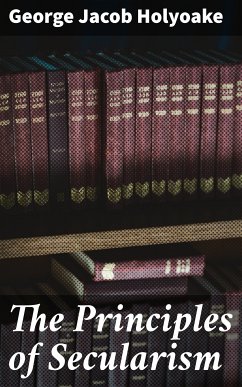
Atheism Among the People (eBook, ePUB)
Enriched edition. Exploring Atheism: A Philosophical Journey through Religious Skepticism and Collective Consciousness
Kommentar: Langley, Brooke / Redaktion: Good Press / Übersetzer: Hale, Edward Everett; Le Baron, Francis
Versandkostenfrei!
Sofort per Download lieferbar
0,49 €
inkl. MwSt.
Weitere Ausgaben:

PAYBACK Punkte
0 °P sammeln!
In "Atheism Among the People," Alphonse de Lamartine presents a profound examination of the rise of atheism in 19th-century France, addressing the socio-political undercurrents that influenced this shift. Written in a lyrical yet analytical style, the book weaves philosophical reflections into a rich tapestry of historical context, revealing the conflict between reason and faith. Lamartine's eloquent prose invites readers to contemplate the implications of widespread disbelief on societal values and moral frameworks, situating his arguments within the larger narrative of Romanticism, which sou...
In "Atheism Among the People," Alphonse de Lamartine presents a profound examination of the rise of atheism in 19th-century France, addressing the socio-political undercurrents that influenced this shift. Written in a lyrical yet analytical style, the book weaves philosophical reflections into a rich tapestry of historical context, revealing the conflict between reason and faith. Lamartine's eloquent prose invites readers to contemplate the implications of widespread disbelief on societal values and moral frameworks, situating his arguments within the larger narrative of Romanticism, which sought to reconcile emotion with rational thought. As a prominent poet, politician, and historian, Lamartine's deep engagement with themes of spirituality and existential inquiry is evident throughout his oeuvre. His personal experiences with love, loss, and political disillusionment profoundly shaped his worldview, lending a unique perspective to his exploration of atheism. Lamartine's interactions with key intellectual movements of his time, including socialism and Romanticism, further inform his nuanced critique of secular ideologies. This book is essential for readers interested in the intersection of faith and reason, as well as those keen on exploring the cultural shifts of 19th-century Europe. Lamartine's thoughtful discourse provides valuable insights into contemporary discussions of belief and doubt, making it a compelling read for both scholars and casual readers alike. In this enriched edition, we have carefully created added value for your reading experience: - A succinct Introduction situates the work's timeless appeal and themes. - The Synopsis outlines the central plot, highlighting key developments without spoiling critical twists. - A detailed Historical Context immerses you in the era's events and influences that shaped the writing. - An Author Biography reveals milestones in the author's life, illuminating the personal insights behind the text. - A thorough Analysis dissects symbols, motifs, and character arcs to unearth underlying meanings. - Reflection questions prompt you to engage personally with the work's messages, connecting them to modern life. - Hand-picked Memorable Quotes shine a spotlight on moments of literary brilliance. - Interactive footnotes clarify unusual references, historical allusions, and archaic phrases for an effortless, more informed read.
Dieser Download kann aus rechtlichen Gründen nur mit Rechnungsadresse in A, B, BG, CY, CZ, D, DK, EW, E, FIN, F, GR, H, IRL, I, LT, L, LR, M, NL, PL, P, R, S, SLO, SK ausgeliefert werden.













